Will Potter's Blog, page 21
March 27, 2013
Court Dismisses Animal Enterprise Terrorism Act Lawsuit. Here’s How That Affects You.
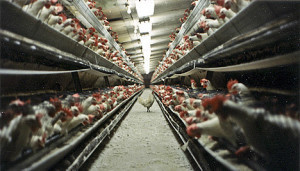 A U.S. district court has dismissed a lawsuit by animal rights activists that argued a federal law has put them at risk of being labeled “terrorists.”
A U.S. district court has dismissed a lawsuit by animal rights activists that argued a federal law has put them at risk of being labeled “terrorists.”
Five longtime animal rights activists filed the lawsuit against the Animal Enterprise Terrorism Act, which is a law passed in 2006 at the request of groups like the National Cattlemen’s Beef Association, Pfizer, and GlaxoSmithKline.
The activists cited vague and overly broad language throughout the law wrapping up protest activity that causes a “loss of profits,” along with its attempted use against activists for protesting and chanting. All of this, combined with the “eco-terrorist” public relations campaigns of industry groups and the harassment of law enforcement, has had a chilling effect on animal rights activists. This was the foundation of the lawsuit brought by the Center for Constitutional Rights: the AETA has not been used against the plaintiffs, but it has made them afraid to speak up.
The U.S. District Court for the District of Massachusetts took a very narrow reading of the AETA, and dismissed the lawsuit. But that’s not necessarily a bad thing. Here’s why:
The Good
In hopes of getting the case thrown out, the government argued that the activists didn’t have legal standing to bring the suit in the first place. In order to make this argument, the government had to argue that the activists are not personally at risk under the law. The judge agreed:
“Plaintiffs have not alleged an intention to engage in any activity prohibited by the AETA. The conduct they seek to participate in – lawful and peaceful advocacy – is very different: documenting factory conditions with permission, organizing lawful public protests and letterwriting campaigns, speaking at public events, and disseminating literature and other educational materials. None of Plaintiffs’ proposed activities fall within the statutory purview of intentionally damaging or causing loss of real or personal property or intentionally placing a person in reasonable fear of death or serious injury.”
In other words, the Justice Department and District Court are both making clear that the AETA can’t be used against the types of activism listed above. The government is publicly limiting its official interpretation of the law, and rebuking what some industry groups and lobbyists have sought. That’s good news.
The Bad
Those statements about the law’s scope are positive developments, but they are not binding in any way. They are ammunition to be used in the defense of activists in court, and they may even be a deterrent to prosecutors and industry, but they’re not safeguards.
More troubling, though, is that Judge Tauro’s ruling completely sidesteps the core First Amendment arguments at issue in this case by noting that these activists aren’t breaking the law. It relies on the idea of “lawful” conduct as a crutch: if activists are behaving lawfully, the reasoning goes, they have no reason to fear prosecution, and thus no right to challenge the law in court.
As the government argued:
“None of this activity involves the deliberate damaging of personal property or other unlawful or violent actions such as trespass, theft, or harassment – the type of conduct targeted by the statute.”
The statement above is a victory in that it limits the scope of the law, but it does not go nearly far enough.
For example, note that “trespass” is included alongside “violent actions.” As I argued in my Congressional testimony — and as supporters of the law conceded — this could be used against activists who non-violently break the law through civil disobedience. And as FBI documents revealed, the bureau has considered prosecution undercover investigators as “terrorists” because they “trespassed” and caused a loss of profits.
In addition, “theft” would include activists who rescue animals from horrific cruelty and neglect. Removing a suffering animal from a factory farm without permission may not be legal, but it is certainly should not be the purvue of terrorism legislation.
On top of all this is a much bigger concern. Across the country, states are considering “ag-gag” bills that criminalize undercover investigators, whistleblowers, and even journalists. Those bills became law in three states last year. Some of the bills this year are so broad that they criminalize anyone who takes photographs or video of factory farms, or who “possesses” or “distributes” that footage. The court’s promises about “lawful” activity not being at risk are meaningless as corporations are seeking to radically redefine the law.
The Future
Given the concerns I raised above, and given the “ag-gag” bills pending across the country, it may come as a surprise that I think this lawsuit has been a victory.
The ruling itself will be appealed, according to activists and the Center for Constitutional Rights. That legal fight continues. This dismissal is a setback, but it is not an unexpected one.
Meanwhile, some of the worst-case scenarios envisioned by some attorneys and activists have been dispelled by the government on the record. If activists do find themselves in court, this will be invaluable.
Most importantly, this lawsuit reflects a sea-change within the animal rights movement. For years, some animal activists have behaved as if ignoring these ongoing corporate and government attacks would make them go away. Macho posturing and short-sightedness created a climate in which merely acknowledging the growing repression was a sign of weakness; the response to fear was simply to pretend that fear does not exist.
This lawsuit is about stripping the AETA of that fear. These activists are shining a public spotlight on corporate tactics that for decades have thrived in the dark. As we have seen with the growing chorus of opposition to “ag-gag” bills, most people are outraged that anti-terrorism resources are being used to target animal advocates. The problem is that the general public is completely unaware it is happening. Sunlight is this industry’s worst enemy, both in terms of exposing factory farms and exposing corporate attempts to label activists as “terrorists.”
By coming forward and shining a light on this legislation in court, activists are confronting their fear, and their opposition, head-on.
March 22, 2013
Upcoming Speaking Events at Georgetown Law, UNC, Miami, NYU, and More
 Hey everyone. I’ve got a few speaking events coming up, and I hope you can attend or share with friends in the area. I’ll be focusing much of my time on “ag-gag” bills that are pending across the country. [For background, check out my article for Vice, or my interview with NPR.]
Hey everyone. I’ve got a few speaking events coming up, and I hope you can attend or share with friends in the area. I’ll be focusing much of my time on “ag-gag” bills that are pending across the country. [For background, check out my article for Vice, or my interview with NPR.]
March 23, 2013
University of North Carolina School of Law:
“Criminalizing Animal Activism: ‘Ag Gag’ Bills and the Animal Enterprise Terrorism”
I’ll be giving the keynote speech at the animal law symposium. Act.”
March 27, 2013
Georgetown Law School:
“Behind Closed Doors: ‘Ag-Gag’ Bills, Farm Animals, Food Safety and the First Amendment”
Panel discussion with representatives from the ACLU, ASPCA, Government Accountability Project, and Compassion Over Killing
RSVP on Facebook
Click here to book a speaking event at your university!
March 30, 2013
Florida International University School of Law:
Animal law symposium
I’ll be giving the keynote at this year’s animal law symposium
April 4, 2013
Cardozo School of Law:
The Animal Enterprise Terrorism Act
Noon, room 304
April 4, 2013
NYU:
Panel discussion hosted by the animal studies initiative
April 10, 2013
University of Tennessee, Knoxville
6pm. More details to come.
April 17, 2013
George Washington University:
Earth Day lecture
March 14, 2013
VICE: “New laws make it safer to beat the shit out of chickens”
 My first article for Vice magazine is now online. “New laws make it safer to beat the shit out of chickens.” It’s a detailed look at “ag-gag” bills pushed by the factory farming industry to silence whistleblowers and journalists.
My first article for Vice magazine is now online. “New laws make it safer to beat the shit out of chickens.” It’s a detailed look at “ag-gag” bills pushed by the factory farming industry to silence whistleblowers and journalists.
One such investigation by Mercy For Animals led to criminal charges in North Carolina, and a top state government official resigned in a corruption scandal.
“Chances are that if one of these laws had been in place, we would not have been able to get the footage we did,” said Vandhana Bala, general counsel for Mercy for Animals. “We would not have been able to see the government corruption and the illegal activity that is currently being prosecuted if there had been an ag-gag bill in North Carolina.”
I’m excited to get this issue out in front of a new audience, and I hope you’ll check out the full article on Vice.com. Please be sure to “like” and retweet and all that fun stuff, because it shows Vice ya’ll would like me keep writing. Thank you!
March 6, 2013
“This is an industry that wants to operate in total secrecy, and with total immunity” (video)
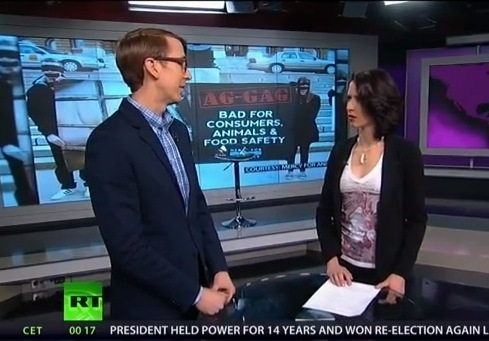 I had the pleasure of being a guest on Abby Martin‘s show, Breaking the Set, last night. We talked about “ag-gag” bills that are being introduced around the country in an attempt to censor whistleblowers, investigators, and journalists who expose animal welfare abuses on factory farms.
I had the pleasure of being a guest on Abby Martin‘s show, Breaking the Set, last night. We talked about “ag-gag” bills that are being introduced around the country in an attempt to censor whistleblowers, investigators, and journalists who expose animal welfare abuses on factory farms.
“This is an industry that wants to operate in total secrecy, and with total immunity. There’s virtually no oversight of factory farming and big agriculture in this country. There are no animal welfare laws that protect these animals during their lives. The only meaningful check and balance on this system are undercover investigators.”
Watch the full interview below. Thanks again to Abby for having me back on the show. If you haven’t checked out Breaking the Set, please subscribe to their YouTube channel or check your local TV listings.
March 2, 2013
NPR Interviews Will Potter on “Ag Gag” Bills, and Labeling Whistleblowers as “Terrorists”
 I’m a huge fan of NPR’s “On the Media.” It’s hands-down some of the sharpest, most comprehensive coverage of free speech, privacy, and media issues. So I was thrilled to be back on the program recently talking about “ag gag” bills that threaten undercover investigators, whistleblowers, and even journalists.
I’m a huge fan of NPR’s “On the Media.” It’s hands-down some of the sharpest, most comprehensive coverage of free speech, privacy, and media issues. So I was thrilled to be back on the program recently talking about “ag gag” bills that threaten undercover investigators, whistleblowers, and even journalists.
As NPR’s Brooke Gladstone notes, undercover investigations are often used today by animal protection groups, but the tactic has roots in investigative journalism like Upton Sinclair’s The Jungle. “Since then,” Gladstone says, “many journalists have used the same tactic to expose the hidden corners of our food supply.”
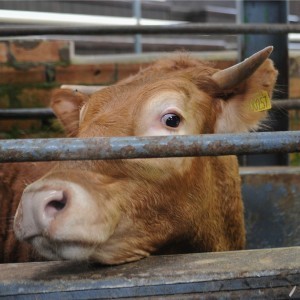 I really hope you’ll take a few minutes to listen to this full interview. Gladstone and producer Jamie York were able to weave together the full scope of this issue, including the FBI’s classification of undercover investigators as terrorists, and how new laws like the Animal Enterprise Terrorism Act conflate the “loss of profits” with criminal activity. We also talk about the types of animal abuse that the industry is trying to hide.
I really hope you’ll take a few minutes to listen to this full interview. Gladstone and producer Jamie York were able to weave together the full scope of this issue, including the FBI’s classification of undercover investigators as terrorists, and how new laws like the Animal Enterprise Terrorism Act conflate the “loss of profits” with criminal activity. We also talk about the types of animal abuse that the industry is trying to hide.
Here’s one of my comments:
“[The Animal Enterprise Terrorism Act] and other bills focus on economic loss. And when we start talking about the loss of profits, the most signficant threat to those profits in recent years has not been broken windows, it has been activists who have actually been opening windows into how these operations work by creating video footage.”
As Gladstone noted, most of the outrage against these bills has come from consumer advocates and animal protection groups. But journalists need to step forward in opposition as well.
[PS: If you don't mind, please "like" the story on NPR as well to thank them for covering this issue!]
GOOD NEWS! Two Anarchist Grand Jury Resisters are Free: Judge Cites “Strength of Their Convictions”
 For the past five months Matt Duran and Katherine “KteeO” Olejnik have been in jail for refusing to talk about their friends or about their political beliefs. They were never accused of any crime; they took a principled stand against a federal grand jury targeting anarchists. During that time, one of the other grand jury resisters was released under questionable circumstances, Maddy Pfeiffer was imprisoned for resisting, and Kerry Cunneen received a grand jury subpoena. And for the last two months, Duran and Olejnik have been in solitary confinement, which has taken a toll on their physical and mental health.
For the past five months Matt Duran and Katherine “KteeO” Olejnik have been in jail for refusing to talk about their friends or about their political beliefs. They were never accused of any crime; they took a principled stand against a federal grand jury targeting anarchists. During that time, one of the other grand jury resisters was released under questionable circumstances, Maddy Pfeiffer was imprisoned for resisting, and Kerry Cunneen received a grand jury subpoena. And for the last two months, Duran and Olejnik have been in solitary confinement, which has taken a toll on their physical and mental health.
As the Los Angeles Times noted:
The pair have been the subject of public demonstrations and an appeal by the Seattle Human Rights Commission, which this month argued that holding them isolated for 23 hours a day with little human contact could cause permanent psychological injury.
Through it all they did not waver in their political statement of non-cooperation. Last week in Seattle, U.S. District Judge Richard A. Jones recognized this and granted their attorney’s motion to release them.
“Their resolve appears to increase as their confinement continues”
– Judge Jones
The story isn’t over yet. Maddy Pfeiffer is still in jail. Another grand jury in California is winding down, but is still a threat. And it’s possible that Duran and Olejnik could face criminal contempt charges for their non-cooperation (they were jailed on civil contempt).
But Judge Jone’s strongly-worded order is a huge victory for these activists, and everyone concerned about civil liberties. It directly speaks to the power of non-cooperation, public outreach, and community solidarity.
The government does not dispute the witnesses’ assertions that confinement in the special housing until entails 23 hours of solitary confinement in their cells and an hour of solitary time alone in a larger room each day, a single fifteen-minute phone call each month (as opposed to five hours of monthly phone time for detainees outside the special housing until), and exceedingly limited access to reading and writing material. Their physical health has deteriorated sharply and their mental health has also suffered from the effects of solitary confinement.
Their confinement has cost them; they have suffered the loss of jobs, income, and important personal relationships. They face the possibility of criminal convictions for contempt… both she and Mr. Duran have nonetheless refused to testify…
The court has observed both Ms. Olejnik and Mr. Duran in their prior appearances before the court. Whatever the merits of their choices not to testify, their demeanor has never given the court reason to doubt their sincerity or the strength of their convictions…
The witnesses face confinement that could last another thirteen months, and their is always the chance that additional confinement will break the resolve of the contemnor. For these witnesses, hoewever, their resolve appears to increase as their confinement continues…
February 23, 2013
Sea Shepherd’s Pirate Book Club in Antarctica, with Incredible Photos
 The crew of the Sea Shepherd Conservation Society put themselves on the front lines defending whales against illegal Japanese whalers in Antarctic waters. A few days ago, the whaling fleet’s slaughterhouse ship, the Nisshin Maru, rammed three Sea Shepherd ships, the Steve Irwin, Bob Barker, and Sam Simon (and also hit the whalers’ own fuel ship).
The crew of the Sea Shepherd Conservation Society put themselves on the front lines defending whales against illegal Japanese whalers in Antarctic waters. A few days ago, the whaling fleet’s slaughterhouse ship, the Nisshin Maru, rammed three Sea Shepherd ships, the Steve Irwin, Bob Barker, and Sam Simon (and also hit the whalers’ own fuel ship).
The reckless actions of an 8,000-ton vessel threatened a hundred lives at sea.
Even though the Nisshin Maru overwhelmingly outweighs any Sea Shepherd vessel at five times their size, the activists stood their ground. Because of their courage, they shut down whaling in the Southern Ocean Whale Sanctuary that day, suspended illegal refueling operations, and most likely shut down whaling for the season.
The Sea Shepherd volunteers have inspired millions of people around the world by putting their lives on the line like this day after day, campaign after campaign. To put it mildly: they kind of have their hands full.
So it was quite a surprise to get a message a few days ago that the crew had some photos they wanted to send me. In between shutting down illegal whaling they snapped a few photos with copies of Green Is the New Red from the Sea Shepherd library. With glaciers. In Antarctica.
Pirate book club!
Few things are as uplifting as when folks you respect support what you’re doing. These photos sum up everything the book and website is about: learn from this information and then take action. A heartfelt thank you to my friends at sea for the very kind gesture. (I would return the support, but a photo of me with a Sea Shepherd t-shirt at my laptop isn’t quite so exciting.)
Check out the rest of the photos, and then find out more about Sea Shepherd’s campaigns.
February 22, 2013
Big Ag Wants to Rewrite the Law So That You’ll Never See This
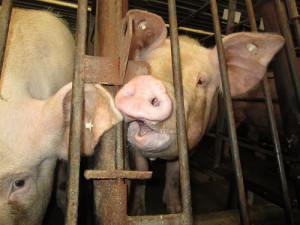 This oped was distributed by OtherWords.org, a project of the Institute for Policy Studies, to about 1,700 newspaper and online editors in America’s heartland.
This oped was distributed by OtherWords.org, a project of the Institute for Policy Studies, to about 1,700 newspaper and online editors in America’s heartland.
Do you have a right to know where that steak on your plate came from?
Should it be legal to photograph chicken farms and dairy cows?
Big Agriculture says you don’t and it shouldn’t. Armies of Big Ag lobbyists are pushing for new state-level laws across the country to keep us all in the dark. Less restrictive versions have been law in some states since the 1980s, but the meat industry has ratcheted up a radical new campaign.
This wave of “ag-gag” bills would criminalize whistleblowers, investigators, and journalists who expose animal welfare abuses at factory farms and slaughterhouses. Ten states considered “ag-gag” bills last year, and Iowa, Missouri, and Utah approved them. Even more are soon to follow.
Had these laws been in force, the Humane Society might have been prosecuted for documenting repeated animal welfare and food safety violations at Hallmark/Westland, formerly the second-largest supplier of beef to the National School Lunch Program. Cows too sick to walk were being slaughtered and that meat was shipped to our schools, endangering our kids. The investigation led to the largest meat recall in U.S. history.
More recently in Wyoming, video footage showed workers at a Tyson supplier kicking live piglets and pummeling mother pigs. The film led to criminal charges against nine employees, including two managers. In Pennsylvania, an investigation of a major regional egg supplier, Kreider Farms, showed decomposing birds packed into cages among the living. Other hens had their heads stuck in cage wire and were left to die.
Big Ag wants to silence whistleblowers rather than clean up its act. Ag-gag bills are now pending in Pennsylvania, Arkansas, Indiana, Nebraska, and New Hampshire. Similar legislation may crop up in North Carolina and Minnesota.
The bills aren’t identical, but they share common language — sometimes even word-for-word. Some criminalize anyone who even “records an image or sound” from a factory farm. Others mandate that witnesses report abuses within a few hours, which would make it impossible for whistleblowers to secure advice and protection, or for them to document a pattern of abuses.
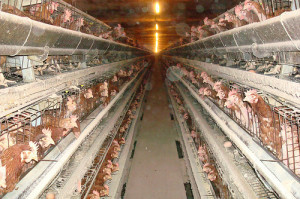
Indiana’s version of this cookie-cutter legislation ominously begins with the statement that farmers have the right to “engage in agricultural operations free from the threat of terrorism and interference from unauthorized third persons.”
Yet these bills aren’t about violence or terrorism. They’re about truth-telling that’s bad for branding. For these corporations, a “terrorist” is anyone who threatens their profits by exposing inhumane practices that jeopardize consumer health.
It’s too early to tell how many of these bills stand a chance of passing. But ag-gag supporters have no shortage of wealth and political influence.
As a journalist, I’m worried about what these bills mean for freedom of the press. And the investigators and whistleblowers I have interviewed are deeply concerned about their own safety and freedom.
Ag-gag bills aren’t about silencing journalists and whistleblowers. They’re about curbing consumer access to information at a time when more and more Americans want to know where our food comes from and how it’s produced.
The problem for corporations is that when people have information, they act on it. During a recent ag-gag hearing in Indiana, one of the nation’s largest egg producers told lawmakers about a recent investigation. After an undercover video was posted online, 50 customers quickly called and stopped buying their eggs. An informed public is the biggest threat to business as usual.
An informed public is also the biggest threat to these ag-gag bills. In Wyoming, one of the bills has already failed. According to sponsors, it was abandoned in part because of negative publicity. By shining a light on these attempts, we can make sure that the rest fail as well, while protecting the right of consumers to know what they’re buying.
Will Potter is a journalist based in Washington, DC. He is the author of Green Is the New Red, which documents corporate attempts to silence environmental activists. Distributed via OtherWords. OtherWords.org
February 6, 2013
Georgetown University Required Reading

Green Is the New Red is required reading in Georgetown University’s “Critical Studies on Political Violence.”
See what other students and professors are saying about the book, too.
Thanks to Michael for sending in the photo from Georgetown’s campus bookstore!
January 30, 2013
Sam Seder Interviews Will Potter for The Majority Report (audio)

I had a great time talking to Sam Seder for the latest episode of The Majority Report. Here’s a description of the show:
Investigative reporter, Will Potter explained why the FBI is monitoring non-violent activists, how corporations created the eco-terror scare, Will’s own experience being harassed by FBI agents for passing out leaflets, and who the major corporations behind environmental group targeting.
Listen to the interview over at The Majority Report. (With intro music from The Clash, how can you go wrong?) Big thanks to Sam and his crew for having me on the show.







